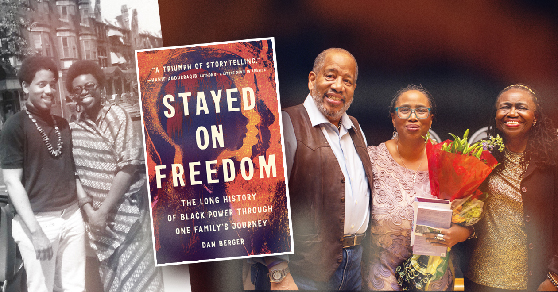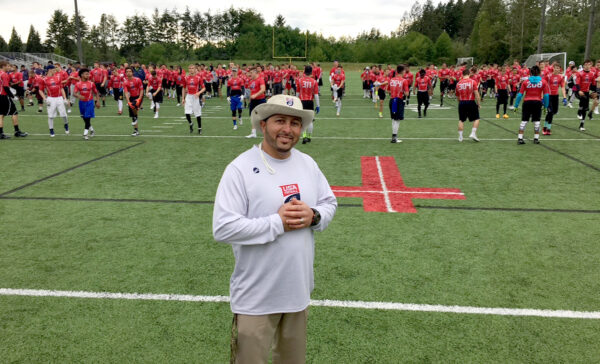History loves heroes. The era of Black Power and the struggle for equal rights conjures names such as Rosa Parks, Malcolm X, Martin Luther King, Jr and John Lewis.
A new book by University of Washington Bothell’s Dr. Dan Berger, however, is a reminder that much good is also done by everyday folks trying their best to meet their moment in history.
In “Stayed on Freedom: The Long History of Black Power through One Family’s Journey,” Berger tells the story of the decades-long political activism of Zoharah and Michael Simmons, along with their daughter, Aishah Shadidah Simmons.
The book, which is based on hours of interviews with the subjects themselves and others in their world, was published in January by Basic Books. Its title comes from a gospel tune, “I woke up this morning with my mind stayed on Jesus,” that civil rights workers revised to be “stayed on freedom” for protests in 1961.
The book forms a portrait of people living in the heart of civil rights and anti-war movements — in the United States and then later globally — from the turbulent 1960s across the decades to the current era of unceasing police abuses and the Black Lives Matter movement.
A commitment to collaborative storytelling
“What follows is a story of love, hope, despair and persistence in pursuit of justice,” Berger writes in the preface. “The book is two people’s stories, as those stories intersect, divide and parallel each other. It is neither only their story nor all of their story. Rather, it encapsulates how people made through social movements remain, as the gospel song reworked to be a civil rights anthem puts it, stayed on freedom.”
Berger, a professor in the School of Interdisciplinary Arts & Sciences, is a historian of activism, Black Power and the carceral state in 20th century history. His last book, “Captive Nation: Black Prison Organizing in the Civil Rights Era,” won the 2015 James A. Rawley Prize from the Organization of American Historians. He also co-wrote “Rethinking the American Prison Movement” with Toussaint Lasier and co-edited “Remaking Radicalism: A Grassroots Documentary Reader of the United States, 1973-2001” with Emily Hobson.
Although he is the author “Stayed on Freedom,” Berger emphasized that the book is truly a collaboration with the Simmons family.
“There’s a history of white scholars parachuting into communities that are not their own and sort of extracting knowledge and keeping all the proceeds from it,” he said. “A lot of my work tries to work against that mode.”
Persistence in the pursuit of justice
Zoharah and Michael Simmons met as activists. He came from the North, she from the South. Michael was raised in Philadelphia by parents who had left the South in the 1930s as part of the Great Migration. Zoharah was born Gwendolyn Robinson in Memphis and raised by her grandmother, whose own grandmother had been enslaved. Her name remained Gwen until she took the name Zoharah in the 1970s.
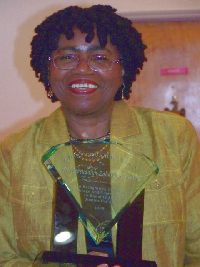
Michael and Gwen met in Atlanta in 1965 while serving on the Student Nonviolent Coordinating Committee, a high-profile civil rights organization. Gwen had reached a position of leadership in SNCC and had worked — and been arrested — during the voter registration campaign in Mississippi in what was called the Freedom Summer. She was first in her family to go to jail, after being the first to go to college, at historically Black Spelman College.
The two worked together on the 1965 campaign to elect SNCC cofounder Julian Bond to the Georgia state legislature. While Bond won handily, the state legislature refused to seat him because of SNCC’s opposition to the war in Vietnam. The U.S. Supreme Court ruled in Bond’s favor, however, and he was seated in 1967, serving until 1975.
This was a time when the American Civil Rights Movement was merging with the growing popular resistance to U.S. involvement in the war in Vietnam. And Michael and Gwen were beginning to see racial inequity as not an American phenomenon alone but as part of a worldwide struggle for freedom.
Awakening to the global perspective
“It’s an ongoing evolution that the book tracks, and it starts with their upbringing,” Berger said. “I think their ability to place themselves in the larger world continues through the book.”
He said part of what drew Michael and Gwen together was the sense of a global spirit of solidarity. “The back half of the book recounts a number of travels that they make to Vietnam, to Cambodia, to Southern Africa, to Jordan, to China,” Berger said. “And Michael moving to Budapest, Hungary, and doing a lot of work there … and also throughout the former Yugoslavia and the former Soviet Union.”
There were tough times, too, for the Simmons. Michael was sent to prison for 2 1/2-years after what Berger called an “extensive cat and mouse game” of address changes and other antics to resist Selective Service attempts to induct him into the Army during the Vietnam War.
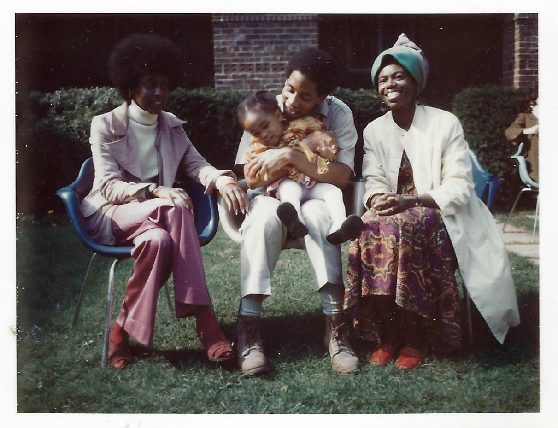
Through the decades, however, they each continued working in the U.S. and abroad, with the American Friends Service Committee, a Quaker peace and justice organization, as did their daughter Aishah.
Indeed, the book also shares the story of Aishah Shadidah Simmons, who was born in 1969 and was a young coparticipant in Zoharah and Michael’s activism. As an adult, Aishah Simmons has become a professor and filmmaker. She directed “NO! The Rape Documentary” addressing sexual assault in the Black community and has publicly confronted having been sexually abused years before by Michael’s stepfather.
One family’s unfolding story
Though their brief romantic involvement did not continue, Michael and Zoharah remained close friends.
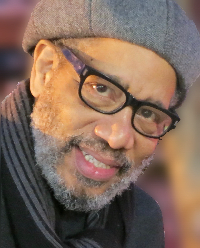
“Their bond was indeed permanent, joined by parenthood and principle,” writes Berger. “In the decades to come, each one would stay on freedom by bringing Black Power politics to ever-widening geographies. They shared, broadly, an outlook on the world’s problems and an abiding commitment to transformation. They would compare notes often. Yet theirs would be parallel journeys.
“Black Power is the bridge connecting the twentieth-century battles against Jim Crow to the ongoing fights against war, racism, patriarchy and capitalism,” Berger writes. “For the Black struggle for freedom has always exceeded the boundaries of person, place and thing, of time and place, that have been put on it.”
While it is understandable to look back on the Civil Rights Movement “with a sense of tremendous inspiration at the changes that people were able to accomplish,” Berger said, “at the same time there are too many reminders that the work remains unfinished.”
He said his own wish for the book, and the Simmons family as well, is “to put the spotlight on, as the preface called them, everyday people. People who just sort of happen to find themselves in these situations and create opportunities from being in these situations — who try to meet the moment as best they can.”
Walking the walk, day by day
Zoharah Simmons recently retired as an assistant professor at the University of Florida’s College of Liberal Arts & Sciences. Michael was living and working in Hungary until COVID brought him back to the United States.
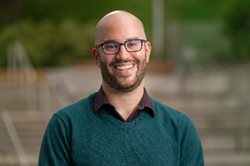
“These are people who have been involved for about six decades and are not especially well known,” said Berger. “My goal and their goal is not to make them famous, by any means — but to show that most change that happens in the world is brought about by people you’ve never heard of.”
Free ‘Stayed on Freedom’ book event Feb. 27 in Seattle
UW Bothell’s Dan Berger and activist Michael Simmons will speak at a book launch for “Stayed on Freedom: The Long History of Black Power through One Family’s Journey” on Monday, Feb. 27, 6-7:30 p.m., at the Washington State Labor Council AFL-CIO Seattle office, 321 16th Ave. S., Seattle. The event is free and open to the public.
Also speaking will be Cherika Carter, secretary treasurer of the Washington State Labor Council. Moderating the event will be M. Aziz, assistant professor of African American Studies in the UW’s Department of American Ethnic Studies on the Seattle campus.
